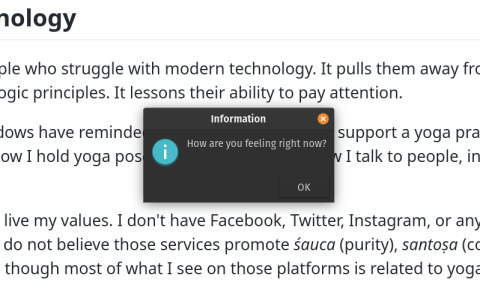I have been thinking a lot about attention recently. "Reclaim Your Attention" is the title of my article in the current issue of MN Yoga + Life Magazine (it's free at various places in Minnesota, but not available online) and the workshop I will be offering at the MN Yoga Conference next month. With both of those, I focus on using techniques such as yoga, meditation, breathwork, and chanting to improve attention. Here I'd like to mention one way I have been using software to help pay attention.
Recently, I learned about a simple technique to help stay focused from Dr. Ram Tamang, an ayurvedic physician based in Southern California. He says that one of the most influential tools in his personal practice is to take regular pauses during the day and ask himself every few hours, "How do I feel right now?"
It seems like such a simple thing to do. I have heard countless yoga and meditation teachers say something similar. But while other teachers recommend paying attention "regularly," or even "constantly," Dr. Tamang aims to check in once every yāma, a Sanskrit word for a unit of time equivalent to about three hours. Further, he suggests not just to think about how you feel in that moment, but also to consider if you want to keep feeling that way for the next three hours or if you want to make any adjustments.
I found Dr. Tamang's suggestion intriguing and I wanted to try it for myself. Like most people, I cannot remember to do something over and over again, day after day without some support. But while others might look to an "app store" for software to add to their phone, I prefer to maintain as much control over my notifications as possible and limit the number of apps on my phone. Most apps want my attention and actively try to steal my attention. That's not at all what I want.
Instead I turned to software on my laptop called Zenity (which I have written about previously). Since it's free software, I can see the source code and know what it does. It just took one line of code to tell my laptop to use Zenity to ask me how I'm feeling :
0 */3 * * * zenity --info --text="How do you feel right now?" --display=:1Once every 3 hours a window pops up on my screen like this:

I think Dr. Tamang is on to something. I see that question on my computer and I sometimes immediately realize I was caught up in an unhelpful thought and almost immediately let it go. Those little pop-up reminders have helped me pay attention to my life and have led to positive changes. It turns out not all pop-up windows are annoying and technology can support a yoga practice.
In Yoga Sutra I.20, Patañjali (trans. by Kate Holcombe) writes:
"For those of us who were not born into states of higher consciousness or knowing, we must cultivate self-confidence and conviction to help us maintain our persistence and strength, and to remember our direction so that we may attain our goal of a focused mind and clear perception."
By choosing to engage with modern life, rather than retreat to a forest or a cave, we must accept the fact that we will encounter challenges. Attention merchants and people peddling "quick fixes" and flashy "apps" will tempt us. But as Patañjali reminds us, we must focus our attention and remember our goals. We can also choose tools, like pop-up windows on our computers, that align with our principles to help support us along our journey.

Comments2
Teaching awareness to kids
Excellent! I would love to see more teachings on paying attention for children. Especially for kids who struggle in school.
Related resources
Hi Hiyala!
There is a lot of good information about helping kids pay attention. A couple resources that might be of interest to you are Little Flower Yoga and Mindful Schools. In the future, we would like to be able to offer more of that kind of information through onelove.yoga.